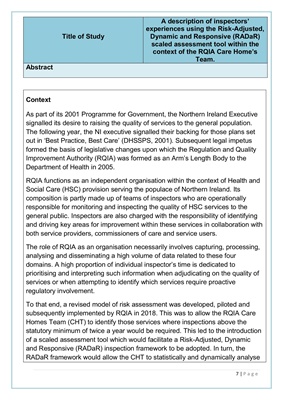
7 | P a g e
Title of Study
A description of inspectors'
experiences using the Risk-Adjusted,
Dynamic and Responsive (RADaR)
scaled assessment tool within the
context of the RQIA Care Home's
Team.
Abstract
Context
As part of its 2001 Programme for Government, the Northern Ireland Executive
signalled its desire to raising the quality of services to the general population.
The following year, the NI executive signalled their backing for those plans set
out in 'Best Practice, Best Care' (DHSSPS, 2001). Subsequent legal impetus
formed the basis of legislative changes upon which the Regulation and Quality
Improvement Authority (RQIA) was formed as an Arm's Length Body to the
Department of Health in 2005.
RQIA functions as an independent organisation within the context of Health and
Social Care (HSC) provision serving the populace of Northern Ireland. Its
composition is partly made up of teams of inspectors who are operationally
responsible for monitoring and inspecting the quality of HSC services to the
general public. Inspectors are also charged with the responsibility of identifying
and driving key areas for improvement within these services in collaboration with
both service providers, commissioners of care and service users.
The role of RQIA as an organisation necessarily involves capturing, processing,
analysing and disseminating a high volume of data related to these four
domains. A high proportion of individual inspector's time is dedicated to
prioritising and interpreting such information when adjudicating on the quality of
services or when attempting to identify which services require proactive
regulatory involvement.
To that end, a revised model of risk assessment was developed, piloted and
subsequently implemented by RQIA in 2018. This was to allow the RQIA Care
Homes Team (CHT) to identify those services where inspections above the
statutory minimum of twice a year would be required. This led to the introduction
of a scaled assessment tool which would facilitate a Risk-Adjusted, Dynamic
and Responsive (RADaR) inspection framework to be adopted. In turn, the
RADaR framework would allow the CHT to statistically and dynamically analyse